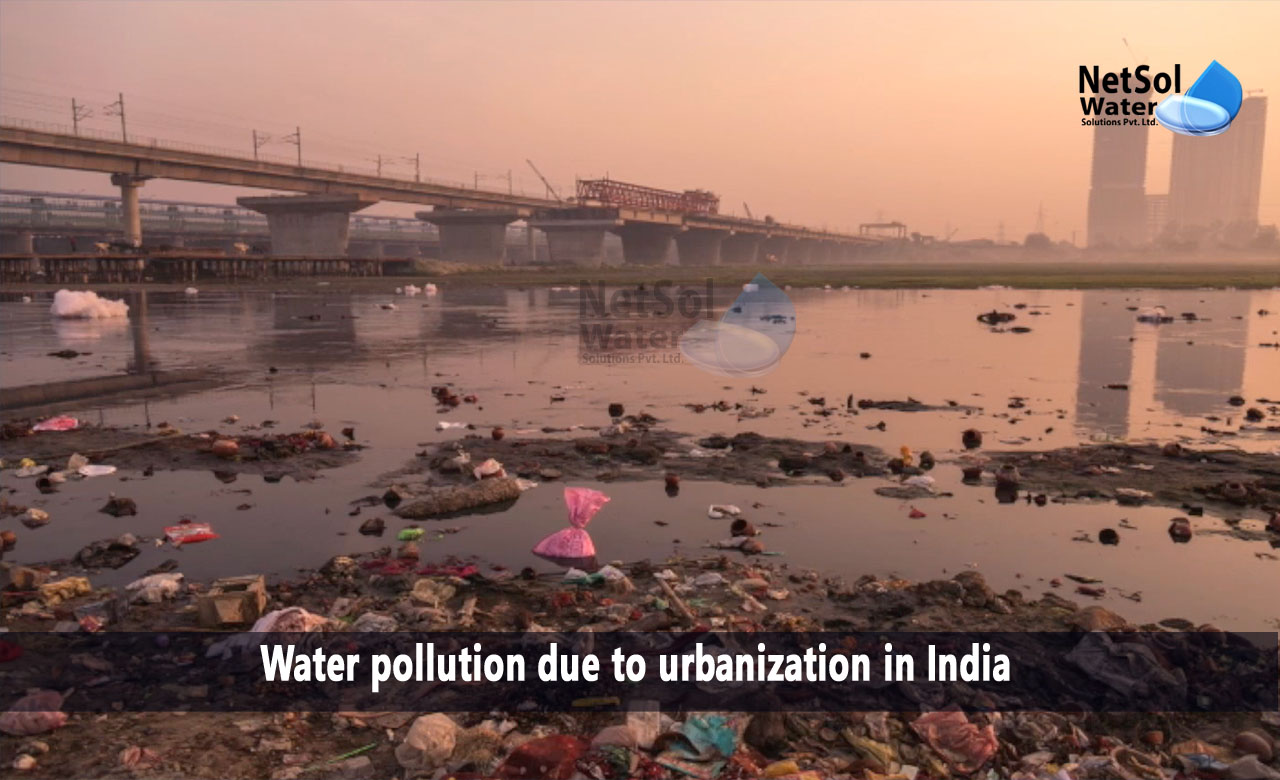In India, rivers, streams, lakes, ponds, wells, and other bodies of water are tapped in metropolitan areas for domestic and industrial use. Water provided for home use loses over 80% of its volume as effluent. Most often, this wastewater is discharged into the environment untreated, which results in significant water pollution.
Here, we will learn about the water pollution that is caused by the urbanisation in India.
In India, there are a number of sources of water pollution. One of the main/primary causes is urbanisation.
India's recent rapid urbanisation has resulted in a number of environmental issues, including water supply, wastewater generation, and the collection, treatment, and disposal of this waste. Many towns and communities that were built along rivers have not given the issue of wastewater, sewerage, etc. enough consideration.
What happens to the wastewater generated due to urbanization?
Firstly, a portion of it seeps into the earth and taints the water below. Wastewater production in Class-I cities (cities with a population over one lakh) can reach 16,662 MLD (million litres per day). Sewage treatment facilities are available to about 70% of the population in class-I cities.
Secondly, according to the most recent estimate, only 6,000 MLD (or roughly 26%) of the 23,000 MLD of wastewater created gets treated before being released; the remainder is disposed of untreated. In cities with active sewage treatment facilities, levels of treatment range from 2.5% to 89% of the generated sewage.
Thirdly, municipalities discharge treated, partially treated, or untreated wastewater into natural drains that join rivers or lakes, or they use it on land for irrigation/fodder agriculture, or they send it to the sea, or a mix of these.
Nowadays, municipal wastewater treatment systems in India do not get rid of heavy metal traces. Every consumer of water has likely been exposed to unknown levels of contaminants over time, because extremely contaminated rivers serve as the primary source of municipal water.
Water pollution caused due to urbanization in India
Over the past few decades, facilities for running water have been added to numerous municipalities and even some villages. Due to the use of flush toilets and increased domestic water use for washing dishes, clothes, and other items, there is now a significant amount of wastewater produced.
With higher living standards, there has also been a significant increase in the use of soap and detergents, as well as the quantity of different food ingredients pouring down the drain. Yet sewerage has trailed behind water supply by a wide margin. Just 22% of the wastewater from class-I cities and 14% from class-II cities, according to estimates by the Central Pollution Control Board (CPCB), is collected by sewerage.
Conclusion
Many cities and municipalities either have no sewerage system at all, or their sewerage system is broken or overburdened. All of this leaves a significant amount of wastewater uncollected.
Migration of the poor from the nearby rural areas worsens the situation in large cities. These individuals move to the cities in pursuit of employment. Just roughly 40–50% of the people in large cities like Delhi, Mumbai, Kolkata, Chennai, and Bangalore are reportedly served by sewer systems, according to a CPCB estimate. Even in places where there are sewers, they frequently leak or overflow, allowing their contents to enter storm drains, or other surface drains or seep into the ground to reach ground water. Uncollected and untreated sewerage water frequently makes its way to streams, contaminating them, and causing water pollution.
Get high quality water and wastewater treatment from Netsol!
At Netsol Water, we provide industrial wastewater treatment plants, as well as commercial water treatment plants, as a service by combining technology, knowledge, and funding to reliably meet customer needs at a fixed price. Our highly experienced and trained field crew is prepared to assist you in achieving your operational and sustainability goals, thanks to our 10 years of expertise assisting some of the largest end-users in India, with their water and wastewater treatment needs.
Therefore, we are delighted to offer field services and assistance with the choice of treatment products, in addition to providing comprehensive system design and engineering. To find out more, get in touch with us at +91 9650608473 or enquiry@netsolwater.com



